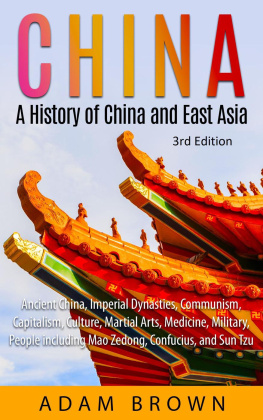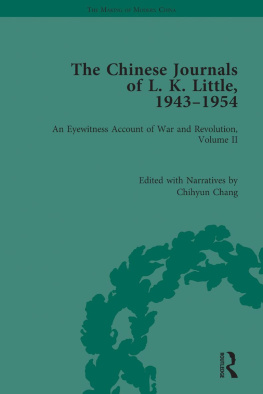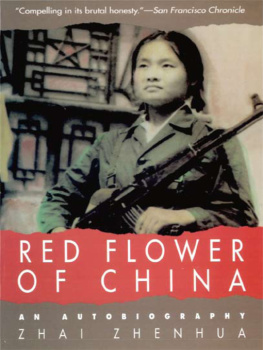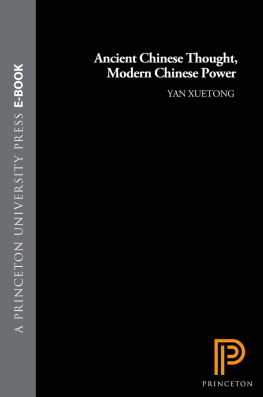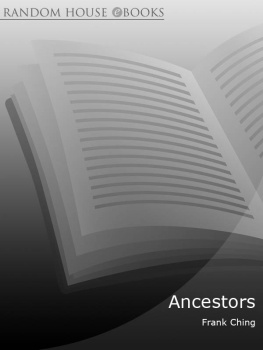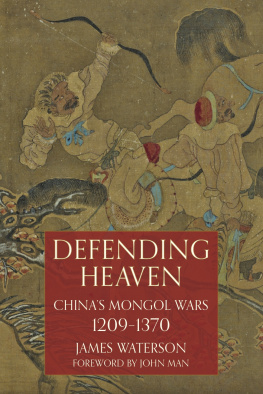A Woman Soldiers Own Story
A Woman Soldiers Own Story
THE AUTOBIOGRAPHY OF XIE BINGYING
Xie Bingying
TRANSLATED BY
Lily Chia Brissman & Barry Brissman
COLUMBIA UNIVERSITY PRESS NEW YORK
COLUMBIA UNIVERSITY PRESS
Publishers Since 1893
New York Chichester, West Sussex
cup.columbia.edu
Copyright 2001 Lily Chia Brissman and Barry Brissman
All rights reserved
E-ISBN 978-0-231-50274-0
Library of Congress Cataloging-in-Publication Data
Xie, Bingying, 19062000
[N bing zi zhuan. English]
A woman soldiers own story : the autobiography of Xie Bingying / Xie Bingying ; translated by Lily Chia Brissman and Barry Brissman.
p. cm.
ISBN 0-231-12250-0 (alk. paper)
1. Xie, Bingying, 19062000. 2. Authors, Chinese20th centuryBiography. I. Brissman, Lily Chia. II. Brissman, Barry, 1942 III. Title.
PL2765.I45 Z5213 2001
895.185109dc21
2001023514
A Columbia University Press E-book.
CUP would be pleased to hear about your reading experience with this e-book at .
Contents
Xie Bingying
WHEN I WAS YOUNG, I COULD NOT UNDERSTAND WHY REBELLING against my parents was such a bad thing. I only wanted to be educated, just like my brothers, and to escape the feudal traditions of having my feet bound and my marriage arranged. I joined the Northern Expedition and fought the warlords partly to gain my countrys freedom, partly to gain my own. This book describes the first thirty-two years of my life. It is the story of a Chinese girl who wanted to choose her own destiny in a country bound up in tradition and prejudice. I began the autobiography at the suggestion of Lin Yutang, who wished to publish it in Universal Wind, a magazine he edited at that time. I began writing it when I was in Changsha and I completed the first volume in the spring of 1936.
Many newspapers in Shanghai and Nanjing gave the book favorable reviews when it appeared, calling it a sincere and truthful description of a young girls struggle to educate herself and to rebel against suffocating feudal traditions. In those days many young girls were in the same situation as I, but often they were not as lucky as I in gaining their freedomyet they continued to struggle. As a result of their efforts, most modern Chinese women do not suffer the pain of bound feet, and many have escaped the shame of arranged marriages. Also, many now receive an education equal to that which men receive. All these are signs of human progress.
My father was a scholar from the last years of the Qing dynasty, and for thirty-seven years he served as the principal of Xinhua County Middle School. He respected the doctrines of Confucius and Mencius, loved his family, loved his country, and favored equality between males and females. My mother was a strong-willed woman whose motto was No failure allowed, only successa spirit she transmitted to her children. As for my brothers, they were pleased when my autobiography was published and glad to have a female writer in the family. Even so, they disapproved of my having become a rebel and run away from home.
But all that was many years ago. I hope that now, at last, my parents are happy and at peace under the Nine Fountains.
My daughter Lily has worked closely with me to preserve the spirit and sense of my book as she has translated it into English. I hope that you, my new audience, will find in it many pleasures, both historical and literary.
San Francisco
AUGUST 1996
Barry Brissman & Lily Chia Brissman
FOR MORE THAN SEVENTY YEARS XIE BINGYING WAS A LEADING Chinese writer. During that time the list of her published works grew to include a multitude of diaries, novels, short stories, childrens books, travel books, and essays. But her reputation has always rested primarily on her autobiographical works, perhaps because they contain her most poetic and historically important writing and her most dramatic portrayal of women fighting to free themselves from the bondage of ancient Chinese tradition.
Xie Bingying lived through a period during which people of all classes in China were groping their way toward an uncertain future. After the Qing dynasty vanished in 1912, Sun Yat-sen, Chiang Kai-shek, Mao Zedong, and many others struggled to build a new China. Internal confusion and external threats unsettled the country. Warlords stepped in and filled the power vacuum in many provinces, including hers. And people everywhere were anguished (as they had been for years) about the humiliation that China continued to suffer at the hands of imperialist Japan and imperialist nations of the West.
This was also a period in which many young women were struggling to find a way to play more fulfilling roles in Chinas ancient society. Some young Chinese women, like Xie Bingying, did succeed in changing their lives. Many others failed. Her autobiography, A Woman Soldiers Own Story, illustrates that womens struggle for equality is something that has been going on for a long time in both East and West.
Xie Bingying was born in 1906 in a small village in Hunan Province. Even as a child she resisted the traditional values of her strong-willed mother, for she was like her mother in willfulness. She went to school (with the help and encouragement of her sympathetic older brothers), but then broke off her studies in 1926 to join the National Revolutionary Army in its Northern Expedition against warlords who controlled much of China at that time. From the war front she sent back personal reflections to a Hankou newspaper, and these writings became her first book, War Diary, published in 1928. After the war she, like many other young Chinese women in similar circumstances, was ostracized by much of society. People who had once supported her as she marched off to war were now contemptuous of her modern lifestyle and considered her a short-haired radical. Penniless, she returned to her native village. There she attempted to dissolve the marriage contract that her parents had drawn up when she was a toddlerbut her mother would not allow her to do this. In fact, her mother locked her up and kept her a prisoner in the family home.
Xie Bingying made three attempts to run away. All three failed. At last she was forced to go through with the ancient wedding ceremony her family had arranged, but she did so only as part of a scheme to break free of her family. The scheme worked. Her marriage was never consummated and Xie Bingying escaped to Changsha. From there she took a boat to Shanghai to begin a new life. All this she tells in the first volume of her autobiography.
In Shanghai, Xie Bingying lived the bohemian life of a poor artist, studying and writing. After several months she moved to Beijing, but rumors that she was politically undesirable eventually forced her to leave her teaching position there and to resign her editorial responsibilities at a womens monthly publication. She later traveled to Tokyo to study Japanese, for she intended to devote herself to bringing classics of Western literature to her countrymen by translating them from the Japanese into Chinese. Before she could begin her task, she was thrown into prison when Puyi, the last emperor of the Qing dynasty, visited Japan and she refused to acknowledge him as a legitimate ruler in Chinaan experience she recounts in a book called Inside Japanese Prison. She returned to China and in 1937, eleven years after her first military experience in the Northern Expedition, she again went to war, this time to fight the invading Japanese. She organized the Hunan Womens War Zone Service Corps and led these women to the front lines, where they worked for months under terrible conditions to help the wounded and the dying. The second volume of her autobiography ends as she lies ill in a hospital, looking out the window toward the front lines where cannon fire touches the sky.


